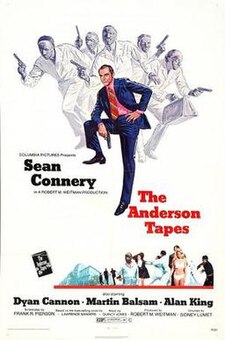The Anderson Tapes
| The Anderson Tapes | |
|---|---|

original movie poster
|
|
| Directed by | Sidney Lumet |
| Produced by | Robert M. Weitman |
| Screenplay by | Frank Pierson |
| Based on |
The Anderson Tapes 1970 novel by Lawrence Sanders |
| Starring |
Sean Connery Dyan Cannon Martin Balsam Alan King |
| Music by | Quincy Jones |
| Cinematography | Arthur J. Ornitz |
| Edited by | Joanne Burke |
|
Production
company |
Robert M. Weitman Productions
|
| Distributed by | Columbia Pictures |
|
Release date
|
|
|
Running time
|
95 minutes |
| Country | United States |
| Language | English |
| Budget | $3 million |
| Box office | $5 million (US/Canada) |
The Anderson Tapes is a Technicolor 1971 American crime film in Panavision directed by Sidney Lumet, starring Sean Connery and featuring Dyan Cannon, Martin Balsam, and comedian Alan King. The screenplay was written by Frank Pierson, based upon a best-selling 1970 novel of the same name by Lawrence Sanders. The film is scored by Quincy Jones and marks the feature film debut of Christopher Walken.
It was the first major film to focus on the pervasiveness of electronic surveillance, from security cameras in public places to hidden recording devices. Following the Watergate scandal a few years later, covert surveillance, and who is listening, became the themes of several 1970s films such as The Conversation and The Parallax View.
Burglar John "Duke" Anderson (Sean Connery) is released after ten years in prison. He renews his relationship with his old girlfriend, Ingrid (Dyan Cannon). She lives in a high-class apartment block (1 East 91st Street) in New York City and Anderson, almost instantly, decides to burgle the entire building in a single sweep – filling a furniture van with the proceeds. He gains financing from a nostalgic Mafia boss and gathers his four-man crew. Also included is an old ex-con drunk, "Pop" (Stan Gottlieb), whom Anderson met in jail, and who is to play concierge while the real one is bound and gagged in the cellar.
...
Wikipedia
